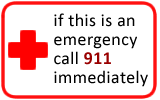Pinworms
Pinworms
Does this describe your child's symptoms? |
Click image for more info |
Definition
Symptoms
Cause
Return to School
|
When to Call Your Doctor |
Call Your Doctor During Weekday Office Hours If |
|
|
|
Parent Care at Home If |
|
|
HOME CARE ADVICE FOR PINWORMS |
Treatment for Pinworms
Pinworm Medicine:
If a pinworm was seen, your child's doctor will probably prescribe a special pinworm medicine. Take as directed.
Give a repeat dose of the pinworm medicine in 2 weeks (Reason: to prevent reinfection).
This interval is chosen because pinworm eggs can remain viable in the environment for 1 to 2 weeks, depending on room temperature and humidity.
Contagiousness:
Pinworms are mildly contagious.
Treat family members only if they have symptoms.
If another child sleeps with the infected child, they also should be treated.
If any of the child's friends have similar symptoms, be sure to tell their parents to get them tested.
Prevention: Wash hands and fingernails carefully before meals and after using toilet.
Call Your Doctor If:
Anal symptoms last over 1 week on treatment
Treatment for Anal Itching Without Pinworm Being Seen
Pinworm Checks: Check your child for pinworms.
Examine the area around the anus, using a flashlight.
Look for a ¼-inch (6 mm), white, threadlike worm that moves.
Do this a few hours after your child goes to bed and first thing in the morning for 2 consecutive nights.
Scotch Tape Test: If no adult pinworm is seen, call your doctor's office for instructions on doing a Scotch-tape test for pinworm eggs or use the following technique:
Touch a piece of clear Scotch tape (with the sticky side down) to the skin on both sides of the anus. Do this in the morning soon after the child has awakened, and definitely before any bath or shower.
Do it 2 mornings in a row.
If no slide available, apply the piece of tape that has touched the skin to a second piece of tape.
Bring the 2 samples in for examination with a microscope.
Steroid Cream: For the itching, wash the skin around the anus. For severe itch, apply 1% hydrocortisone cream (no prescription needed) 4 times per day.
Call Your Doctor If:
Pinworm is seen
Skin around the anus becomes red or tender
Anal itching persists over 1 week
Your child becomes worse
Treatment for Pinworm Exposure or Contact
Low Risk:
If your child has had contact with a child with pinworms but has no symptoms, (and over a month has passed), your child probably won't get them.
If contact is within the last 4 weeks, your child has a small chance of getting pinworms.
Pinworms are harmless and are never present very long without causing anal itching.
Scotch Tape Test: If you're still concerned, call your doctor's office for instructions on doing a Scotch tape test for pinworm eggs in about 1 month. (Reason: The swallowed egg will not mature into an adult pinworm for 3 or 4 weeks.)
Call Your Doctor If:
Pinworm is seen (white, ¼ inch or 6 mm, and moves)
Anal itching persists over 1 week
Treatment for Reducing Reinfection or Spread to Others
Preventing Infection:
Infection is caused by swallowing pinworm eggs.
A child can get pinworms no matter how carefully you keep the kids and the house clean.
The following hygiene measures, however, can help to reduce the chances of reinfection of your child and new infections in other people.
Pets don't carry pinworms.
Hand-washing:
Have your child scrub the hands and fingernails thoroughly before each meal and after each use of the toilet.
Keep the fingernails cut short, because eggs can collect here.
Thumb-sucking and nail-biting should be discouraged.
Shower: Each morning give your child a shower. Always rinse the anal area. Do this for 3 days after taking the pinworm medicine.
Vacuum: Vacuum or wet-mop your child's bedroom once a week, because any eggs scattered on the floor are infectious for 1 or 2 weeks.
Wash Clothes: Machine-washing at hot temperature will kill any eggs present in clothing or bedding.
Contagiousness: Mildly contagious within the home. Children with pinworms do not need to miss any child care or school.
And remember, contact your doctor if your child develops any of the "Call Your Doctor" symptoms.
Updated:
March 22, 2017




